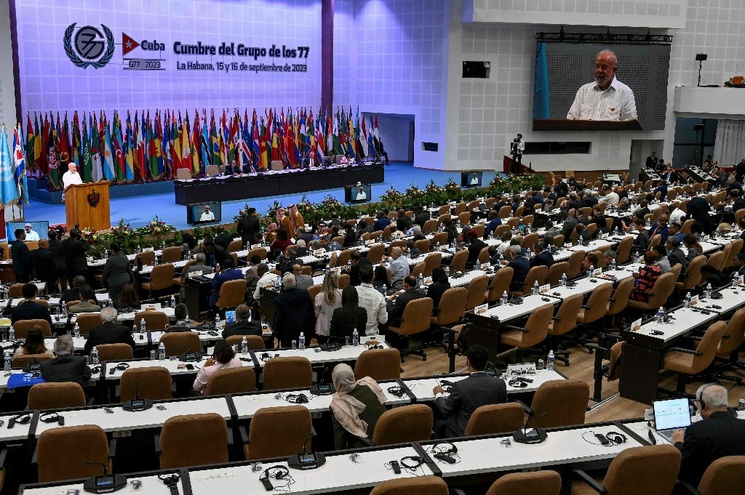La Jornada – Closing of the G77+China Summit; They urge the construction of a new economic model

Havana. Leaders of more than a hundred developing countries, representing 80 percent of the world’s population, concluded their summit in Cuba on Saturday, calling on powers to support the construction of a new international financial architecture in the face of the worsening crisis due to the pandemic. And the technology gap.
Some 114 delegations from the G77+China Forum, a mechanism established in the 1960s that has kept its name despite increasing its initial membership, met on Friday and Saturday in Havana.
“There are two major transformations taking place right now,” Brazilian President Luiz Inacio Lula da Silva said during his opening appearance of the closing day regarding the digital revolution on the one hand and energy changes at the global level. “It cannot be shaped by a handful of rich economies, and re-liberate the relationship of dependency between the center and the periphery.”
Lula added that the countries of the South must “work together again, as we did in the past” to move forward in confronting these two challenges.
The previous day, UN Secretary-General António Guterres opened the discussions by calling on world powers to create a fairer system, and even considered that developing countries had “failed.” The G77 + China specifically constitutes a forum for the global coordination of ideas and policies that will later be brought to the heart of the United Nations.
According to the hosts, who hold the interim presidency of the G77 + China until the end of the year and will be replaced by Uganda in this position by 2024, the delegations showed similarities in analysis regarding the diagnosis of the current situation and the status quo. Need to act. .
“There is agreement on the need for an urgent and profound reform of the outdated international financial architecture so that it is truly representative and addresses the legitimate demands of developing countries,” said Rodolfo Benitez, Director of Multilateral Affairs at the Cuban Foreign Ministry.
During these days, leaders from all continents and the most diverse nations spoke, from the Colombian Gustavo Petro and his Venezuelan neighbor Nicolas Maduro or the Honduran Xiomara Castro, to the Palestinian Mahmoud Abbas or the Iranian Vice President for Scientific Affairs Ruhalad Dehghani Firouz. Al-Abadi. Many attendees also made regional or national claims in relation to those of the great powers.
Li Xi, a member of the Communist Party Central Committee, intervened on behalf of China, stressing that that nation’s government “remains committed to building technological change that allows for the reduction of digital divides.”
The summit’s slogan was “Current Development Challenges: The Role of Science, Technology and Innovation” and the idea was to seek to bring positions closer to discussions at the United Nations.
Delegations agreed to the final declaration shortly before the conference concluded on Saturday. The document underlines the “concern” of countries about the current “unfair” global system for the population of developing countries, which has been exacerbated by the Covid-19 pandemic, and for this reason stresses the “urgent need for a comprehensive reform of the international financial system.” Architecture is more ‘inclusive’.
In this vein, the text rejected unilateral measures or embargoes that rich countries usually impose on underdeveloped countries that seek to pressure them, as well as what it described as technological monopolies that leave these countries lagging behind.
At the same time, he proposed broader funding for technological issues in poor countries and greater cooperation among the countries of the South themselves. He also proposed holding a special United Nations meeting on these aspects.
The summit was held in Cuba at a time when the Caribbean country is suffering from a strong economic crisis resulting from the epidemic crisis and the increase in US sanctions. Many delegations took advantage of these days to hold meetings with President Miguel Díaz-Canel or his officials in strategic areas such as energy, biotechnology – a strong sector here – or agriculture, the last of which was specifically Lula, who was received at the Government Palace of the Revolution at the conclusion of the multilateral forum. .

“Award-winning zombie scholar. Music practitioner. Food expert. Troublemaker.”









